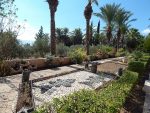Did David know about resurrection and eternal life? Even in Jesus’ time, the Jewish leaders disagreed over whether resurrection was a thing. The Pharisees believed in resurrection. The Sadducees did not. Who knows where this split came from? But did David really know? It seems he did.
Psalm 16
A miktam of David.
Ps 16:1 Keep me safe, O God,
for in you I take refuge.
Ps 16:2 I said to the LORD, “You are my Lord;
apart from you I have no good thing.”
Ps 16:3 As for the saints who are in the land,
they are the glorious ones in whom is all my delight.
Ps 16:4 The sorrows of those will increase
who run after other gods.
I will not pour out their libations of blood
or take up their names on my lips.
Ps 16:5 LORD, you have assigned me my portion and my cup;
you have made my lot secure.
Ps 16:6 The boundary lines have fallen for me in pleasant places;
surely I have a delightful inheritance.
Ps 16:7 I will praise the LORD, who counsels me;
even at night my heart instructs me.
Ps 16:8 I have set the LORD always before me.
Because he is at my right hand,
I will not be shaken.
Ps 16:9 Therefore my heart is glad and my tongue rejoices;
my body also will rest secure,
Ps 16:10 because you will not abandon me to the grave,
nor will you let your Holy One see decay.
Ps 16:11 You have made known to me the path of life;
you will fill me with joy in your presence,
with eternal pleasures at your right hand.
Some background on Psalm 16

On the first Lord’s day, following hard upon the resurrection of Jesus Christ, two people were walking to their hometown of Emmaus from Jerusalem. They were disciples of Jesus, and the name of one of them was Cleopas (Luke 24:18). If this Cleopas was the same man as the Clopas of John 19:25 (which seems likely since the names are nearly identical), and if both were disciples of Jesus and were in Jerusalem at this time (which we know to be the case), then the other of these two disciples was probably Mary, Clopas’s wife.
Cleopas and Mary were despondent because of the death of their master. They had heard reports of an empty tomb and of angels who had told some of the women that Jesus was “risen, just as he said.” Yet they did not doubt that Jesus was really dead and that their dream of a messiah who should reign upon the throne of his father David, the dream that had inspired them for the three long years of Christ’s ministry, was over. While they were making their sad way along their homeward path, Jesus appeared to them. They did not recognize him. “What are you discussing together as you walk along?” he asked them kindly.
They replied by an offhand reference to the “things” that had taken place in Jerusalem.
“What things?” Jesus asked.
“About Jesus of Nazareth,” they answered. “He was a prophet, powerful in word and deed before God and all the people. The chief priests and our rulers handed him over to be sentenced to death, and they crucified him; but we had hoped that he was the one who was going to redeem Israel.”
Jesus chided them for their slowness to believe all that the prophets had spoken. “Did not the Christ have to suffer these things and then enter his glory?” he asked them. Then, “beginning with Moses and all the Prophets, he explained to them what was said in all the Scriptures concerning himself” (see Luke 24:13–27).
That was a sermon I very much wish I could have heard. It was the Lord’s own sermon on the resurrection, a sermon in which he expounded the Old Testament texts that had bearing on his prophesied triumph over the grave on Easter morning.
What texts do you suppose Jesus spoke of?
We cannot know the full answer to that question, of course, though we have strong indications of what some of the texts were, due to the way they were later used by the early disciples in their preaching. But one text we can be certain of is Psalm 16:10. This is because Peter used a section of this psalm to preach the resurrection in his great sermon on Pentecost (Acts 2:25–28, citing Ps. 16:8–11) and because Paul likewise used a shorter portion of it in his sermon to the Jews in the synagogue of Antioch early in his ministry (Acts 13:35–37, citing Ps. 16:10). Psalm 16:10 says,
You will not abandon me to the grave,
nor will you let your Holy One see decay.
If ever there was a clear Old Testament prophecy of the resurrection of the Lord Jesus Christ, it is this statement. It makes Psalm 16 the third specifically messianic psalm in the Psalter, after Psalm 2 and (somewhat less directly) Psalm 8. 1Boice, J. M. (2005). Psalms 1–41: An Expositional Commentary (pp. 129–130). Baker Books.
OK, that was more background than usual. But there’s a reason for it. While I want to point out the prophecy about resurrection and eternal life, that isn’t the thing that struck me as I read the Psalm this morning.
What’s the connection between this life, resurrection, and eternal life?
Are there connections between this life, resurrection, and our eternal life? Yes, there are.
However, verse 6 could lead us to make some false connections. First, here’s the verse. Then we’ll see the “problem”.
Ps 16:6 The boundary lines have fallen for me in pleasant places;
surely I have a delightful inheritance.
Here’s the thing about that verse. It really does imply, if not outright state, that because this life is pleasant – then his inheritance (eternal life as we’ll see in verse 10) will be delightful.
However, that is “Old Testament” thinking. Under the Old Covenant, rewards and punishments were in the lives of people on earth. If not within the individual person’s life, then somewhere in subsequent generations. Eternity was something of God, not of people.
And so, their lives were very much about sin, make a sacrifice, and become clean. But then, it also turned into sin, sacrifice, rinse and repeat, and repeat, and repeat …
What’s the real relationship between this life and the next?
If not verse 6, then where does David make the relationship between this life and the next? It’s right after that, in verses 7 and 8.
Ps 16:7 I will praise the LORD, who counsels me;
even at night my heart instructs me.
Ps 16:8 I have set the LORD always before me.
Because he is at my right hand,
I will not be shaken.
There are three points related to David’s relationship with God:
- David gets his counsel from God.
- Even at night, David’s heart is instructing him from God’s counsel.
- David always had God before him.
And what do those three things have in common? Something else that put David ahead of his time. At the risk of getting ahead of myself in this series, here’s what that “thing” is:
Ps 51:10 Create in me a pure heart, O God,
and renew a steadfast spirit within me.
Ps 51:11 Do not cast me from your presence
or take your Holy Spirit from me.
That “thing” is actually a “who”. The Holy Spirit. When we realize that, the list becomes:
- David gets his counsel from The Holy Spirit.
- Even at night, David’s heart is instructing him from the counselor, God’s Holy Spirit.
- David always had The Holy Spirit with him.
And that part – having the presence of the Holy Spirit, acknowledging Him always, and allowing Him to guide our lives is key to having eternal life with God.
You may read the entire post or continue one section at a time.
Conclusion – Psalm 16 – Did David know about resurrection and eternal life?
So does Psalm 15 include a prophecy about eternal life? It certainly appears so. We also know David had some knowledge of the Holy Spirit. And he tied following the Holy Spirit’s counsel to that eternal life.
However, as we saw, The New Covenant promise includes eternal life, while it’s not mentioned in the Old Covenant. As such, the promises are also different between the Old and New Covenants. One of those differences has to do with what this life will be like. For instance, here’s something Jesus said about this life when we follow Him.
The Beatitudes – Matthew
5:3-12 pp — Lk 6:20-23
Mt 5:1 Now when he saw the crowds, he went up on a mountainside and sat down. His disciples came to him, 2 and he began to teach them, saying:
Mt 5:3 “Blessed are the poor in spirit,
for theirs is the kingdom of heaven.
Mt 5:4 Blessed are those who mourn,
for they will be comforted.
Mt 5:5 Blessed are the meek,
for they will inherit the earth.
Mt 5:6 Blessed are those who hunger and thirst for righteousness,
for they will be filled.
Mt 5:7 Blessed are the merciful,
for they will be shown mercy.
Mt 5:8 Blessed are the pure in heart,
for they will see God.
Mt 5:9 Blessed are the peacemakers,
for they will be called sons of God.
Mt 5:10 Blessed are those who are persecuted because of righteousness,
for theirs is the kingdom of heaven.
Mt 5:11 “Blessed are you when people insult you, persecute you and falsely say all kinds of evil against you because of me. 12 Rejoice and be glad, because great is your reward in heaven, for in the same way they persecuted the prophets who were before you.
That entire passage is sometimes referred to as Jesus’ manifesto on how to live this life.
The whole thing is important for us as Christians. But, for today’s topic, we need to pay special attention to the last two verses:
Mt 5:10 Blessed are those who are persecuted because of righteousness,
for theirs is the kingdom of heaven.
Mt 5:11 “Blessed are you when people insult you, persecute you and falsely say all kinds of evil against you because of me. 12 Rejoice and be glad, because great is your reward in heaven, for in the same way they persecuted the prophets who were before you.
Whereas David had pleasant places in his life because he followed God’s Holy Spirit, we’ll have something different. Insults, lies, persecution, Etc. will be directed at us because we choose to follow Jesus. Just as the Old Testament prophets received the same.
But you know, that’s not surprising. As disciples of Jesus, our role is, in some ways, similar to the prophets of old. They were trying to lead people to God. And so are we, as directed by Jesus in The Great Commission.
The Great Commission
Mt 28:16 Then the eleven disciples went to Galilee, to the mountain where Jesus had told them to go. 17 When they saw him, they worshiped him; but some doubted. 18 Then Jesus came to them and said, “All authority in heaven and on earth has been given to me. 19 Therefore go and make disciples of all nations, baptizing them in the name of the Father and of the Son and of the Holy Spirit, 20 and teaching them to obey everything I have commanded you. And surely I am with you always, to the very end of the age.”
Given the importance of the beatitudes in our lives as Christians, here’s some info on my series on The Beatitudes.
Image by Karin Henseler from Pixabay
Footnotes
- 1Boice, J. M. (2005). Psalms 1–41: An Expositional Commentary (pp. 129–130). Baker Books.
Discover more from God versus religion
Subscribe to get the latest posts sent to your email.


